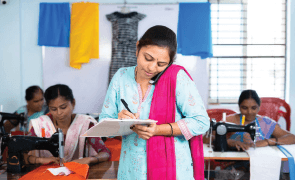Entrepreneurship development is an important pathway for enabling women’s participation in the economy and can be a catalyst for change by providing income-generating opportunities. However, India ranks 57 out of 65 countries in women entrepreneurship. While several challenges faced by entrepreneurs are universal, women entrepreneurs continue to face a host of gender-specific barriers.
In recent years, there has been increasing emphasis on advancing women’s entrepreneurship by the government, private sector and nonprofit organisations. In addition, private sector and philanthropic initiatives are also increasingly focusing on harnessing women’s entrepreneurial potential through a range of targeted programs. There is significant opportunity to mobilise capital and fund underserved regions as well as segments that have growth potential.
This report presents findings from a rapid assessment of the entrepreneurship landscape in urban and peri-urban areas – combining literature review, analysis of secondary data sources and key informant interviews with various ecosystem players. It identifies different archetypes of entrepreneurs, and intervention areas that offer opportunities for collaborative action and mobilising philanthropic investments.
- Firstly, a philanthropic collaborative can play a critical role in “filling the gaps”, by moving capital towards underserved entrepreneur segments and geographies.
- We also find robust evidence in favour of a well-rounded package of interventions to advance women’s entrepreneurial activity and improve business outcomes – instead of a siloed approach.
- Philanthropic collaboratives can drive innovations in solutions and approaches, by diversifying the risk of testing “what works” and adapting it to different contexts.
- Given the complexities that underpin the measurement of women’s entrepreneurial activity and the impact of entrepreneurship development initiatives, collaboratives can invest in longitudinal studies and robust data collection mechanisms.





